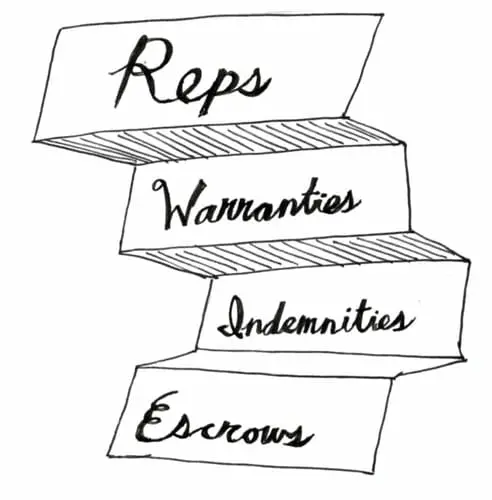Table of Contents
Representations and Warranties, commonly called “Reps and Warranties,” are crucial components of business transactions, particularly in purchase and sale agreements. These terms form the foundation of the contract, encompassing assertions made by both the buyer and seller. This comprehensive article explores the intricacies of Reps and Warranties, their significance, examples, benefits, challenges, and the role of legal professionals in ensuring their accuracy and enforceability.
What Are Representations and Warranties?
Representations are statements of fact made by one party to another, affirming certain conditions or situations at the time of the agreement. The other party relies on these statements to make informed decisions. Warranties, conversely, are promises that specific facts or conditions are accurate and will remain valid for a specific period. They provide a basis for recourse if these facts or conditions are false.

In essence, Reps and Warranties blend past, present, and future elements within the terms of the contract, ensuring both parties have a clear understanding and trust in the transaction.
Components of Reps and Warranties
- Seller’s Representations relate to the information the buyer relies on to value the company. They include:
- Financial statements
- Major contracts
- Consumer and supplier lists
- Equipment listings
- Buyer’s Representations: These relate to the considerations for completing the transaction. They include:
- Legal status of the buyer’s stock
- Shareholder agreements
- Warranties: These cover the present and future conditions, ensuring the product or service is free from defects and will be repaired or replaced if defects arise within a specified period.
Types of Warranties
- Expressed Warranties: These are explicitly stated in the contract and should be insisted upon by buyers.
- Implied Warranties: These fall under the Uniform Commercial Code, ensuring products are fit for a particular purpose even if not explicitly stated in the contract.
Importance of Reps and Warranties
Reps and Warranties play a vital role in business transactions for several reasons:
- Trust Building: They establish trust between the buyer and seller by ensuring all relevant information is disclosed.
- Risk Mitigation: They reduce the risk of financial loss by including indemnification clauses that protect against misrepresentations or omitted representations.
- Legal Recourse: They provide a basis for legal action if one party fails to meet the agreed terms.
Example of Reps and Warranties Clause
An example clause might read:
“Representations and Warranties: The representations and warranties of the Company contained herein shall be true and correct on the date hereof and on and as of the Closing Date, and the statements of the Company and its officers made in any certificates delivered under this Agreement shall be true and correct on and as of the Closing Date.”
This ensures that the company’s statements are accurate both at the time of agreement and at the closing date of the transaction.
Benefits of Reps and Warranties
- Reducing Financial Loss: By including indemnification clauses, Reps, and Warranties help diminish financial losses if critical representations are withdrawn post-transaction.
- Facilitating Deal Closure: Detailed disclosure of the business’s position helps set the stage for closing the sale transaction.
- Providing Full Disclosure: Ensures the buyer understands the business comprehensively, leading to smoother transactions.
- Ensuring Continuity: Buyer’s Reps and Warranties assure their ability to close the deal, often including proof of financing or funds.
Challenges of Reps and Warranties
Despite their benefits, Reps and Warranties can present challenges:
- Survival Periods: Negotiating the survival periods of Reps and Warranties can be contentious, with buyers preferring more extended periods for a thorough inspection and sellers wanting to close deals quickly.
- Legal Interpretation: Misunderstandings can arise if Reps and Warranties are not clearly defined, leading to disputes over their legal interpretation and enforcement.
- Cost Implications: Poor negotiation on survival periods or unclear terms can result in unnecessary expenses for both parties.
Role of Lawyers in Reps and Warranties
Lawyers are crucial in scrutinizing Reps and Warranties to ensure they are fair and comprehensive. Their responsibilities include:
- Ensuring Accuracy: Verifying all facts and statements in the Reps and Warranties.
- Legal Compliance: Ensuring the contract complies with all relevant laws and regulations.
- Risk Assessment: Identifying and mitigating potential risks associated with the transaction.
- Drafting Indemnification Clauses: Including clauses to protect against financial loss due to misrepresentations.
Conclusion
Reps and Warranties are essential elements of business transactions, providing a foundation of trust and accountability between buyers and sellers. Ensuring all relevant information is disclosed and accurately represented facilitates smoother transactions and provides a basis for legal recourse if needed. However, their complexity and potential for misunderstanding require careful drafting and scrutiny by legal professionals. Properly managed, Reps and Warranties can significantly reduce risk and enhance the success of business transactions.
























